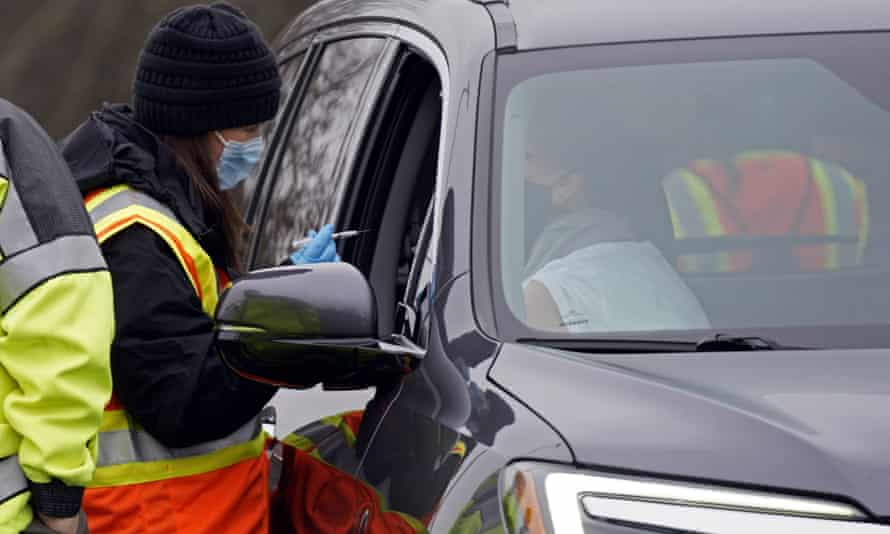Declining demand for Covid-19 vaccines in the US is causing states across the country to refuse their full allocations of doses from the federal government, despite concerted efforts to raise national take-up rates.
Reduced demand, which is contributing to a growing stockpile of doses, comes as nearly 46% of the US population has received at least one dose of a two-shot vaccine and about 34% are fully vaccinated, according to the CDC.
Last week, Joe Biden announced a plan to get at least one dose of vaccine administered to 70% of the nation’s adult population by 4 July – a date also floated for a full-economic and social interaction re-opening of America.
But on Saturday, hours before a pre-recorded message from Biden to a Global Citizen Vax Live event, it was reported that the nation’s vaccination rate dropped to 2m shots a day – a 20% decrease from the week before.
Vaccination rates are still short of the 70% to 85% of the total population that needs to be immune to control the spread of Covid-19.
Last week, Dr Anthony Fauci, the chief White House medical adviser, said he had abandoned “this mystical level of herd immunity”, a notion of collective disease resistance that could come when about 70% of the population has been inoculated.
Reports that many states are requesting that the Biden administration send them only a fraction of their allocations is a clear indication of persistent vaccine hesitancy in the US.
According to the Associated Press, Wisconsin health officials have asked for just 8% of the 162,680 doses that had been set aside for the state next week. Julie Willems Van Dijk, a state health department official, has said demand is softening and vaccinators are reducing existing inventories before ordering more doses.
Iowa health officials have requested 29% of the state’s allotment. Kansas officials asked for 9%, as the state has about 647,000 doses on hand; and Illinois officials says the state has five weeks’ worth of doses on hand and plans to cut its request, also to 9%. Similar patterns were reported by Connecticut – 26% – and South Carolina, 21%. North Carolina and Washington have reduced their requests by 40%.
But some states are maintaining full orders, including Maryland and Colorado. New York City is taking its full quota despite seeing the number of daily shots administered drop by about 40% since a mid-April peak.
“We’ve got the demand to keep using our supply effectively,” the city’s mayor, Bill de Blasio, said.
The drop in orders comes as the Biden administration announced this week that if states don’t order all the vaccines they’ve been allotted, surpluses will be sent to other states with higher demand.
US oversupply comes as countries suffering worsening Covid infections, including India, or those with little access to vaccine supplies, are calling on the Biden administration to release vaccine supplies.
European countries offered a cool response on Friday to a US-backed proposal to waive patent rights on coronavirus vaccines.
Emmanuel Macron, the French president, said the question of sharing patents was not the issue of the day, and called out Britain and the US for blocking the export of vaccines and their ingredients to the wider world, reported Reuters.

At the same time, the US disease experts are looking ahead to a possible surge in infections next winter, and the possibility that seasonal vaccine boosters will be necessary. “We want to hope for the best, and prepare for the worst,” the CDC director, Dr Rochelle Walensky, said in an Instagram interview with actor Jennifer Garner, reported CNN.
“We are doing the studies on boosters to see if we will need them, and that is six months, one year, two years – we don’t really know,” Walensky said. “But we want to be prepared for them should we need them.”
Preparations for seasonal booster shots, however, run ahead of health officials and political leaders’ immediate focus on vaccine hesitancy hardening into outright refusal.
A survey by the Census Bureau survey found that a quarter of adults in Wyoming said that they will “definitely not” or “probably not” receive the Covid-19 vaccine. In Montana, North Dakota, Kentucky and Ohio, more than 20% of adults said the same.
In Wyoming, which has emerged as hesitancy hotspot, just 45% of adults have received at least one dose. Similar rates of vaccine take-up are observed in Mississippi, Alabama, Louisiana, Tennessee and West Virginia. Though reasons for vaccine hesitancy vary widely, it is especially prevalent among political conservatives and that is reflected in the most hesitant states are Republican-supporting.
In North Carolina health officials are reportedly considering paying younger people to get shots, while West Virginia has offered a $100 savings bond to people between 16 and 35 for getting inoculated. Detroit, too, has offered to pay people $50 for every city resident they sign up and then deliver for a shot.
Dr Joshua Sharfstein, the vice-dean at Johns Hopkins University, told ABC News he is not “despairing” of the disappearing mirage of herd immunity. “Herd immunity is not necessarily a moment when the music plays and the sun shines. It is about how easy it is for the virus to pass around in a community, and I think there is a lot more progress to be made.”
This content first appear on the guardian

I’ve been really impressed with CBD gummies and like https://www.cornbreadhemp.com/pages/how-are-thc-gummies-made . They’re not only delicious but also incredibly available for getting a commonplace dose of CBD. I love how tactful they are, making them immaculate for when I’m on the go. I’ve as an individual noticed they remedy me stay calm and saw wood mastery, especially after a stressful day. The steadfast dosage in each gummy also takes the guesswork out of managing how much CBD I’m consuming. If you’re point of view of distressing CBD, gummies are a large opportunity—legitimate be dependable to buy from a trusted name brand repayment for the nicest results!